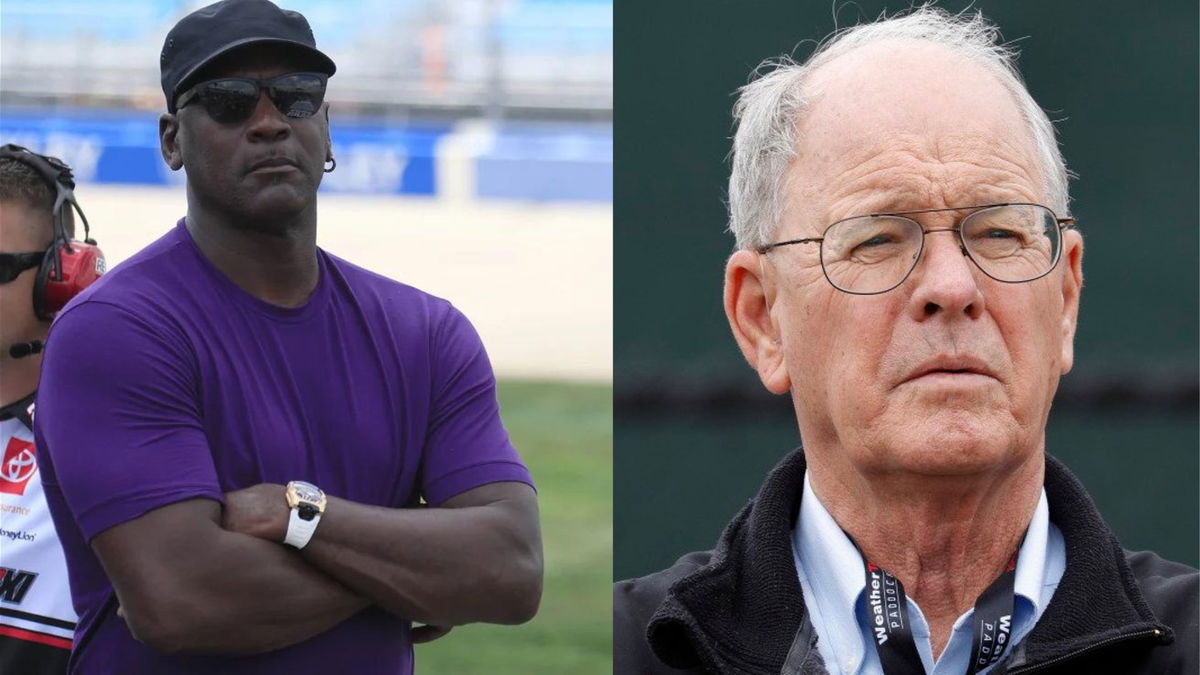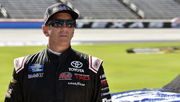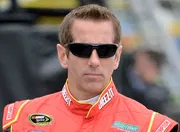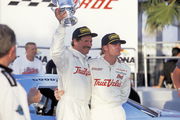

NASCAR executives have been under the radar for hogging the pie more than they need. The racing series under Jim France signed a $7.7 Billion media rights deal with Fox, NBC, Amazon, and Warner Bros. Discovery last November. This felt like a slap on the team owners’ faces who were already struggling to break even financially. Even Michael Jordan’s 23XI lies at risk of pecuniary loss if the higher-ups do not yield to popular demand.
Watch What’s Trending Now!
And that demand is the need to have permanent charters. Forming the “Team Negotiation Committee”, Cup teams are unanimously pleading for an extension of the charter system. Jordan recently entered this debate, making some valid points to further the argument.
ADVERTISEMENT
Michael Jordan underlines NASCAR’s endless hunger
When NBA aficionado Michael Jordan and JGR Cup motorist Denny Hamlin created 23XI Racing in 2020, they had a plan. The Next Gen cars would cost about $18 Million a year, and constructing a new building would cost tens of millions of dollars more. But they accurately predicted that TV viewership would spike, consequently elevating the value of the sport’s broadcast rights.
They were right. But as it turned out, Jim France and Co. moved ahead to eat the greater slice of the pie. In a recent interview with The New York Times, Michael Jordan expanded on the same. “In all partnerships, if you grow the pie, that means your business is going to continue to grow. And to grow the pie, you’ve got to make sure everybody’s healthy within the partnership. If our ownership in NASCAR is losing money and NASCAR’s the only one making money, that’s not a good partnership.”
Besides the higher-ups devouring media money, the charter system is also hanging teams’ futures in balance. Charters are licenses that guarantee entry into, and money from, all 38 of NASCAR’s premier Cup Series events. The current system was introduced in 2016, giving teams the right to sell or buy charters. However, it was only for the length of the current broadcast rights deal, which expires at the end of this year.
ADVERTISEMENT
Michael Jordan: “In all partnerships, if you grow the pie, that means your business is going to continue to grow. … If our ownership in NASCAR is losing money and NASCAR’s the only one making money, that’s not a good partnership.” – @NYTimes https://t.co/vgojefKEIc
— Adam Stern (@A_S12) May 1, 2024
Michael Jordan observed that NASCAR is missing out on crucial gains by denying permanent charters. “If you had permanent charters, then you could create a revenue stream, either with new investors or different types of sponsorships that would subsidize that type of variance between ownership and the league. That’s a big, big miss right there. If you don’t correct that, this sport’s going to die not because of the competition aspect, but because economically it doesn’t make sense for any business people.”
ADVERTISEMENT
If the executives do not yield to demands, racing teams risk losing $200 Million under the current economic model. However, in that scenario, one wild escape route does exist for teams, as suggested by the TNC’s hired lawyer.
Top Stories
Horrific Aerial Footage of Greg Biffle’s Fatal Crash Emerges Leaving NASCAR Community in Tears

Footage Surfaces of Florida Police Arresting NASCAR Veteran Over Disturbing Public Misbehavior

Kenny Wallace Reacts to Brad Keselowski’s Shocking Injury With Unusual Moment of Gratitude

Another Almost Fatal Disaster Surfaces From Statesville Airport Amidst Ongoing Greg Biffle’s Crash Investigation

When NASCAR Didn’t Wait: Dale Earnhardt’s Injury Comeback Came With the Hot Seat of Zero Sympathy

A separate racing series?!
Until the 1990s, Championship Auto Racing Teams, or CART, was the dominant form of motorsport in the US. But in 1996, open-wheel racing experienced a split, as the Indy Racing League was formed to rival CART. By the time the two halves unified again in 2008, they no longer retained their former glory. NASCAR then took over as the motorsport giant on American race tracks.
ADVERTISEMENT
Although such a split is highly unlikely in NASCAR, such an idea has been floated. Jeffrey Kessler, a leading antitrust lawyer, was hired by the Team Negotiation Committee to work through the charter protest. He suggested this wild idea: “One option was for the teams to form their own race series with all the top racers and owners. If NASCAR tried to impede their access to racetracks, they open themselves up to antitrust violations.”
But as NASCAR and Speedway Motorsports own the majority of major racetracks, the current charter teams will have few options left if they opt to go elsewhere.
So hopefully, the higher-ups will recognize the dire needs of racing teams and a deal will be struck.
ADVERTISEMENT
ADVERTISEMENT
ADVERTISEMENT
ADVERTISEMENT

